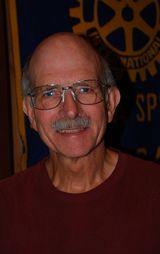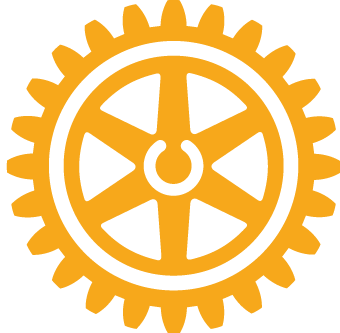
Dave Smith took the floor with a two-fold mission: to beat the drums to find a new chairperson for our chapter of the Rotary Foundation, and to introduce Pagosa Rotary’s latest international project, which will undertake to strengthen high school science instruction in the central African, Saharan nation Niger, which lies south of Algeria and Libya. The new project seems to be essentially a clone of the Senegal project that has been underway for a few years, with very similar objectives and means.
The local Rotary Foundation chairperson position has been open for a couple of years, David reported. He projected a job description on the screen, which filled every available inch with an avalanche of small-font characters, completely illegible to the audience.
With his characteristic, mischievous grin, David explained the slide was printed in such small font on a crowed page because he didn’t want us to see it, and quickly jumped to the next slide before potential candidates could be intimidated. The new slide, he said, summarized the essence of the position in three short words: “communication, organization, encouragement.”
Communication, he continued, with Rotary International to provide a two-way flow of information between it and our club; organization, to stimulate local involvement in Rotary Foundation activities via a local committee; and encouragement, to move us collectively forward to new and better contributions to the mission of the Rotary Foundation to fund humanitarian activities.
Dave digressed briefly with a description of Rotary as a combination of elements like a three-legged stool: local clubs numbering 35,000 with 1.2 million members all over the world, Rotary International, which herds the cats clubs into a semblance of organizational structure, and Rotary Foundation, which provides funding to help support humanitarian projects on the District level and globally, such as the Senegal Project.
With a simple pitch like that, Dave, you’ll find someone to be Foundation chairperson in no time at all.
Then he turned to the upcoming Niger project, that will assist science instruction in the nation’s high schools by providing training and equipment to teachers to facilitate greater use of classroom experiments to improve students’ learning experiences.
As in Senegal, the selection of Niger – an arid land, 80% of which is part of the Sahara – as a project site reflects the nation’s general impoverishment. It is one of the poorest African nations, with $1000 gross national yearly income per capita, and Dave reported that 60% of its population lives on less than $2/day.
Underlying the project is research indicating a correlation between improvement of math and science literacy and economic growth in underdeveloped nations. Additionally, it is hoped that improved international harmony will be a by-product of undertaking a project to support education of high school students in a poor Muslim nation like Niger, of the sort that has often been the breading ground of terrorism.
The project will support science education in four high schools in the capital city of Niamey, which Dave described as a city with a population over 1 million with unpaved streets and only single-story buildings. The proposed annual budget is $57,500, with $16,500 to be provided by Pagosa Springs Rotary, a matching sum from District funds, and the final $25,500 to be provided by a Rotary Foundation grant.
 Pagosa Springs Rotary Club
Pagosa Springs Rotary Club